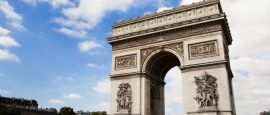Getting around France
The main airline connecting towns and cities within France is Air France (www.airfrance.com). Other options include easyJet (www.easyjet.com), Ryanair (www.ryanair.com) and Air Corsica (www.aircorsica.com).
Air France's France-Europe-North Africa Discount Pass offers a range of discounts on flights operated by Air France and HOP! (a subsidiary of Air France).
France is covered by a busy network of Autoroutes (highway or motorway) and many of them are toll roads. They bear the prefix 'A' and a numeric number. For example A1, A3, A4, A5, A6, A10, A13, A14, A15, A16 radiate clockwise from Paris.
Environmental badges, which are designed to distinguish environmentally-friendly vehicles from those that pollute the air, are obligatory for Paris, Lyon and Grenoble. Cars that are licensed abroad also need environmental badges which can be bought on www.environmentalbadge.com.
Highways and main roads are generally in excellent condition. The bulk of smaller roads are well maintained, but some more remote routes can be in poor condition.
A roads refer to Autoroutes (highways or motorways). Many of them are toll roads. Signs indicating an Autoroute (whether on the highway or pointing to it) are white letters on a blue background.
N roads are national roads. Many of them have been incorporated into D roads.
D roads are managed by the local county. They can be anything from former N roads, busy local routes to quiet country lanes.
Car hire is widely available from international and domestic companies. Most of these require you to be over 21 years old and in possession of a licence for at least a year. You may have to pay a surcharge if you're under 25.
Taxis are widely available in all towns and cities. Train stations are the best places to find a rank.
The locals are passionate about cycling and much of the country lends itself well to exploration by bike. There's a good number of urban and rural bike paths, as well as an extensive network of minor roads with little traffic. Most cities and towns have at least one bicycle hire shop; some, such as Marseille and Paris, have a large-scale public bike share system.
Coaches may not be as efficient as the rail network, but Eurolines (www.eurolines.eu) covers over 200 destinations in France.
The minimum age to drive a car in France is 18, and 16 for a motorcycle under 125cc. The minimum age for hiring a car in France ranges from 21 to 25. Speed limits are 50kph (31mph) in built-up areas, 80kph (50mph) outside built-up areas, 110kph (68mph) on dual carriageways separated by a central reservation, and 130kph (81mph) on motorways.
Visitors who have held a driving licence for less than two years may not travel faster than 50kph (31mph) on regular roads, 100kph (62mph) on dual carriageways and 110kph (68mph) on highways. Drivers are required to carry a breathalyser kit in the vehicle, however, you won't be penalised for not carrying one.
For emergency breakdown services, dial 17 from a roadside box or call 112 from a mobile.
A national driving licence is acceptable. An international sign, distinguishing your country of origin (e.g. GB sticker or plate), should be positioned clearly on the vehicle. EU nationals taking their own cars to France are strongly advised to obtain a Green Card - a document produced by car insurers to prove that a driver has adequate insurance cover for driving abroad. You must also carry the car's registration document.
Urban public transport is excellent. There are comprehensive public transport systems in all the larger towns and cities.
Paris: RATP (Régie Autonome des Transports Parisiens) (www.ratp.fr) controls the underground (métro), rail (RER) and bus services in and around Paris. The public transport network is split into several different fare zones and a single ticket allows travel on any of the systems within that zone (although interchange is only permitted on the métro and RER, and not on buses). The Metro's network of 16 lines makes it a good way to get about central Paris. The RER (fast suburban services) operates five main lines connecting most areas of the capital. There is also an extensive network of conventional suburban services run by French Railways (SNCF).
Other cities: There are trams, trolleybuses and metro in Marseille; trolleybuses, buses, trams, two funiculars and metro in Lyon; and a tramway, bus system, and automated driverless trains in Lille. There are also excellent tram and bus services in St Étienne, Nantes, Grenoble, Limoges and Nancy.
Interrail France Pass is available at www.interrail.eu/en/interrail-passes/one-country-pass/france while Eurail France Pass is available at www.eurail.com/en/eurail-passes/one-country-pass/france.
It's essential to validate (composter) tickets bought in France by using the orange automatic date-stamping machine at the platform entrance.
There are ferries serving multiple destinations including but not limited to:
• Royan and Le Verdon
• Pointe de la Fumée and Ile d'Aix
• Port Fromentine to Ile d'Yeu
• Lorient to Groix
• Nice or Toulon to Corsica
France is crisscrossed with a myriad of rivers and canals and they offer a variety of scenery, a means of visiting many historic villages and localities, and an opportunity to learn much about rural France at a leisurely pace. Worthy diversions include Canal du Midi, Canal latéral à la Loire, River Dordogne, River Loire, The Upper Seine, to name but a few.
Cruising boats may be chartered with or without crews, ranging in size from the smallest cabin cruiser up to converted commercial barges (péniches), some of which can accommodate up to 24 people, plus crew. Hotel boats (large converted barges with accommodation) are also available in some areas, with a wide range of prices and comfort levels. For further information, contact the national or regional tourist board.
Do you have any Feedback about this page?
© 2026 Columbus Travel Media Ltd. All rights reserved. No part of this site may be reproduced without our written permission, click here for information on Columbus Content Solutions.





 You know where
You know where
